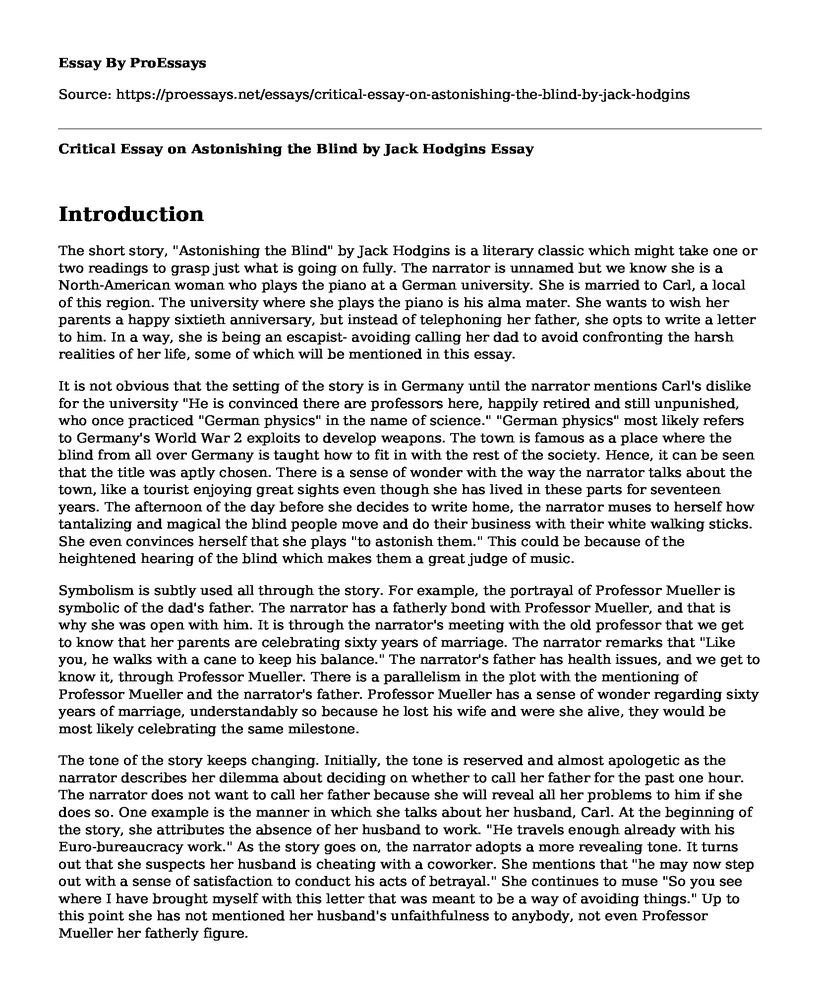Introduction
The short story, "Astonishing the Blind" by Jack Hodgins is a literary classic which might take one or two readings to grasp just what is going on fully. The narrator is unnamed but we know she is a North-American woman who plays the piano at a German university. She is married to Carl, a local of this region. The university where she plays the piano is his alma mater. She wants to wish her parents a happy sixtieth anniversary, but instead of telephoning her father, she opts to write a letter to him. In a way, she is being an escapist- avoiding calling her dad to avoid confronting the harsh realities of her life, some of which will be mentioned in this essay.
It is not obvious that the setting of the story is in Germany until the narrator mentions Carl's dislike for the university "He is convinced there are professors here, happily retired and still unpunished, who once practiced "German physics" in the name of science." "German physics" most likely refers to Germany's World War 2 exploits to develop weapons. The town is famous as a place where the blind from all over Germany is taught how to fit in with the rest of the society. Hence, it can be seen that the title was aptly chosen. There is a sense of wonder with the way the narrator talks about the town, like a tourist enjoying great sights even though she has lived in these parts for seventeen years. The afternoon of the day before she decides to write home, the narrator muses to herself how tantalizing and magical the blind people move and do their business with their white walking sticks. She even convinces herself that she plays "to astonish them." This could be because of the heightened hearing of the blind which makes them a great judge of music.
Symbolism is subtly used all through the story. For example, the portrayal of Professor Mueller is symbolic of the dad's father. The narrator has a fatherly bond with Professor Mueller, and that is why she was open with him. It is through the narrator's meeting with the old professor that we get to know that her parents are celebrating sixty years of marriage. The narrator remarks that "Like you, he walks with a cane to keep his balance." The narrator's father has health issues, and we get to know it, through Professor Mueller. There is a parallelism in the plot with the mentioning of Professor Mueller and the narrator's father. Professor Mueller has a sense of wonder regarding sixty years of marriage, understandably so because he lost his wife and were she alive, they would be most likely celebrating the same milestone.
The tone of the story keeps changing. Initially, the tone is reserved and almost apologetic as the narrator describes her dilemma about deciding on whether to call her father for the past one hour. The narrator does not want to call her father because she will reveal all her problems to him if she does so. One example is the manner in which she talks about her husband, Carl. At the beginning of the story, she attributes the absence of her husband to work. "He travels enough already with his Euro-bureaucracy work." As the story goes on, the narrator adopts a more revealing tone. It turns out that she suspects her husband is cheating with a coworker. She mentions that "he may now step out with a sense of satisfaction to conduct his acts of betrayal." She continues to muse "So you see where I have brought myself with this letter that was meant to be a way of avoiding things." Up to this point she has not mentioned her husband's unfaithfulness to anybody, not even Professor Mueller her fatherly figure.
The narrator realizes at the last minute that writing a letter is a bad idea. She comes to terms that she should have called her father, but now he must have gone out for lunch. The narrator feels guilty about her mother's medical condition. It is ironical how the narrator describes the condition of the people in the nursing home "as blank and confused and helpless as the silent elderly patients we could see in their grassy pen behind the chain link fence" yet cannot think of her mother the same way. Her mother is in the hospital, losing her memories slowly but what stands out is that she still has a love for her husband of sixty years.
Cite this page
Critical Essay on Astonishing the Blind by Jack Hodgins. (2022, Jun 06). Retrieved from https://proessays.net/essays/critical-essay-on-astonishing-the-blind-by-jack-hodgins
If you are the original author of this essay and no longer wish to have it published on the ProEssays website, please click below to request its removal:
- A Response to the City Lights Film
- The Valley of Love Essay
- Effects of Social Media on Teenagers Essay
- Marxist Theory on Hamlet: Research Paper
- Movie Analysis Essay on Before the Flood
- Essay Sample on Metis Music: Capturing a Unique Heritage in Canada
- Movie Analysis Essay on And So God Created a Woman







